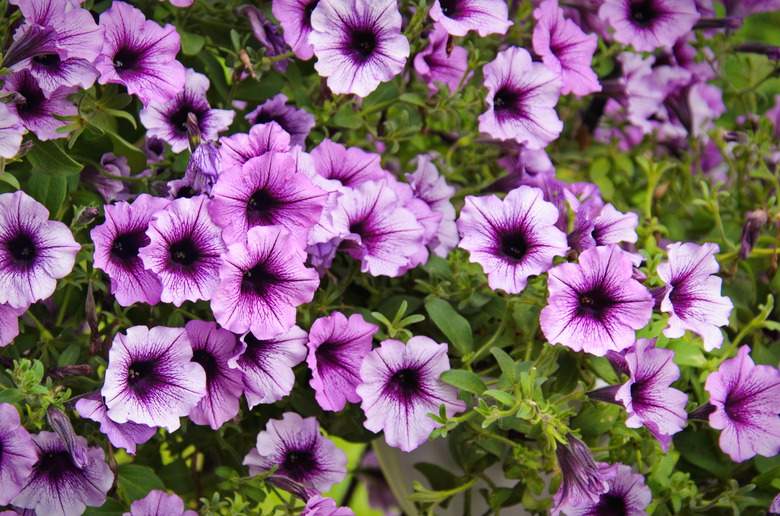Do Rabbits Eat Petunias?
If you're wondering if rabbits eat petunias, you're likely considering this very popular flower garden addition. Among the best-selling bedding plants for quickly adding color and soft textures to the garden, petunias (Petunia hybrida, USDA zones 10-11) are virtually carefree. The low-growing flowers, available in a wide variety of colors and sizes, are unfussy about soil conditions, and thrive in either sun or part shade. But like most flowers, their carefree nature ends when rabbits hop into the picture.
Tip
Rabbits are likely to munch on petunias if they have the opportunity.
About Petunia Flowers
About Petunia Flowers
Most gardeners grow petunias as annuals, although they are perennials in U.S. Department of Agriculture plant hardiness zones 10 to 11. Petunia varieties offer continuous bloom from spring to fall. They rarely top 12 inches in height but often spread two or three times as wide. You'll find them in colors ranging from pastel to bright, with single or double flower heads.
Do Rabbits Eat Petunias?
Do Rabbits Eat Petunias?
Rabbits will munch on petunias if they have the chance. Because rabbits are opportunistic by nature, it's almost impossible to predict which petunia varieties might be more likely to tempt them.
The larger "grandiflora" petunias, many of which are trailing types, offer 5-inch heads of succulent petals. On the other hand, the ground-hugging aspects of the compact "milliflora" types might also appeal to rabbits, which tend to look for the lowest-growing crops. No matter what the variety, one unfortunate fact remains: The most ornamental parts of petunias, the flower heads themselves, are what the furry pests are most likely to remove during the growing season as they graze in your garden.
Petunia varieties fall into the category of annual plants most frequently experiencing severe to moderate damage at the hands, or more accurately, the teeth, of various rabbit species. If you can't seem to protect your flower beds, consider switching to other annual flowers such as vinca (Catharanthus roseus, zones 10-11) or geraniums (Pelargonium x hybridum, zones 10-11). These flowers are seldom damaged by rabbits.
Petunia Planting Strategies
Petunia Planting Strategies
Raising petunias above ground level is the most obvious way to thwart flower-munching rabbits. Consider placing petunias in high raised beds or containers. When you're growing a cascading type of petunia, such as 'Purple Wave,' either set the flowers in very tall pots, or in hanging baskets.
Securing the Garden
Securing the Garden
When you have too many petunias, along with other ornamentals and edibles, to make container or raised beds practical, protecting the yard or garden may be a better option. A lightweight fence with mesh that's 1-inch or smaller will protect petunias and other plants from rabbits, provided you set it up properly. Start by digging a trench at least 6 inches deep, and burying the bottom of the fence in it, with the bottom bent outward. The upper part of the fence should extend at least 3 feet above ground, to thwart even the most determined jumpers.
Remove nearby places rabbits can hide, such as brush, tall weeds, leaf and log piles, and large rocks. These, as well as rotted outbuildings and other detritus, provide the kind of cover that makes rabbits feel secure enough to stick around and chow down on your petunias.
Experiment with commercial spray repellents, and reapply after rainfall or overhead watering. They are available in ready-to-spray bottles, avoiding the need for measuring and mixing. Manufacturers recommend spraying both the plants and the garden perimeter for best results. During dry weather, a monthly spray schedule may be enough. Chemical products aren't advised when petunias are planted among or adjacent to vegetables or other crops you and your family will be eating.
